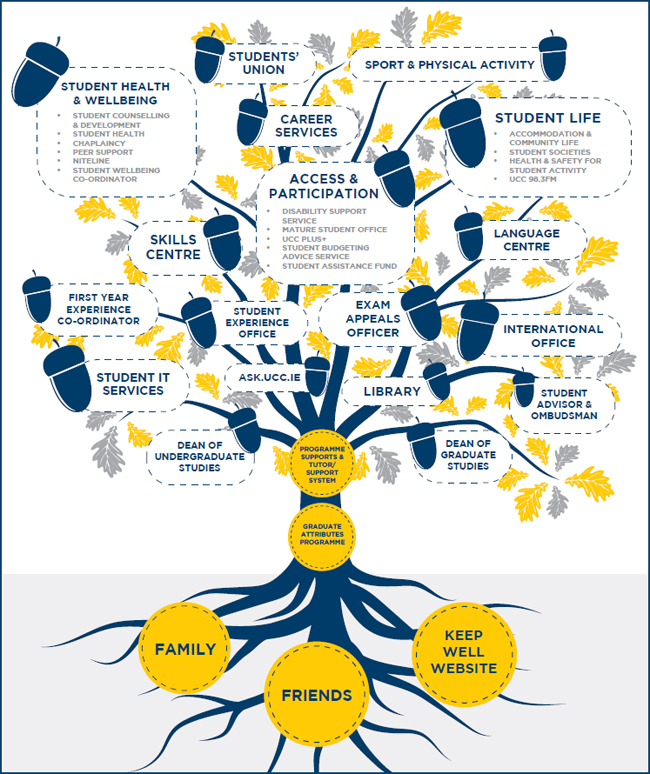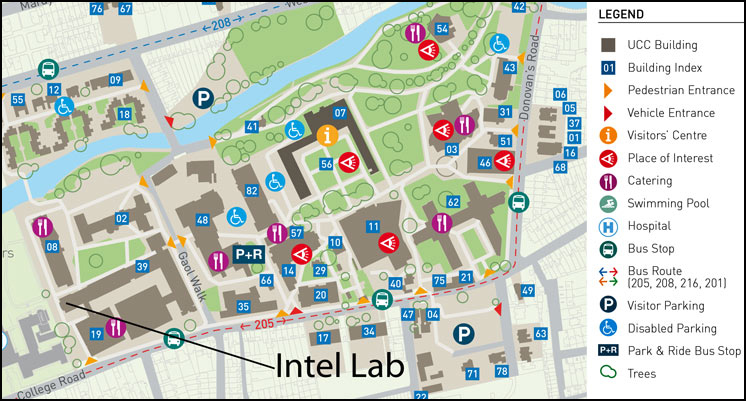In This Section
Resources for Current Students
Student Supports
The "Acorn to Mighty Oak" has come to symbolise students' academic, personal and professional development journey throughout their time at UCC. In alignment with this rich metaphor, the support services available to students are presented in the form of a Support Tree. This tree depicts the support services currently available to students and provides links to further information about each service.

Student Absentee Form
The School of Chemistry supports students who face genuine personal difficulties or who have compelling reasons for not completing prescribed work and assessments. Where this is the case, students must complete the absentee form and send it with certification (medical or sports) as a PDF (.pdf) or Word Document (.doc/.docx) to chemistry@ucc.ie within two weeks. Please ensure to attach the file to your email instead of linking to it:
Students are responsible for providing this documentation. For long absences or complex personal situations, we advise you to discuss this matter with the degree programme coordinator for your year. All documentation and information will be treated with the utmost sensitivity and confidentiality.
Certification for COVID-19 Absence
Since the academic year 2023-24, the School of Chemistry requires certification for absence from a lab or test, or failure to meet a deadline for submission of an assignment, via a medical certificate from your treating clinician/doctor. This requirement now includes absences due to COVID-19.
Practical Exemption Form
For absences, please see:
On occasion when students are required to repeat a module in a subsequent academic year, their performance in the lab component in the first attempt was sufficient and repeating the practical work may not be required. Note students are not automatically granted a practical exemption – this is the decision of the module coordinator in each instance and depends on whether the student has achieved the learning outcomes for the lab course. Eligible students must complete and email the practical exemption form to chemistry@ucc.ie
Use of Mobile Phones in School of Chemistry Teaching Labs
There are significant safety concerns associated with the use of mobile phones in laboratory surroundings, since such usage is well established to distract a user’s attention from their intended laboratory activities. In this context, for the safety of all lab users, use of mobile phones by anyone in School of Chemistry teaching labs is prohibited for anything other than uses that relate directly to the activities involved in relevant experiments. That is, phones or tablets may be used to access practical manuals, spectra and other documentation relevant to the practical, or to take photographs of equipment or apparatus for learning purposes, but use for phone calls, sending messages or accessing e-mails or social media is prohibited. Any student that chooses to use a phone, tablet or laptop in a teaching lab does so at their own risk, i.e., the School of Chemistry is not responsible if any damage occurs to a device that a student has chosen to bring into a lab. Students are strongly advised not to touch their phones or other personal belongings with contaminated gloves.
UCC's Policy for Academic Integrity in Examinations and Assessments
Timetable of the Academic Year 2025/26
| Semester Periods | First Semester Period | Christmas Recess | Second Semester Period | Easter Recess |
|---|---|---|---|---|
| Dates | 08/09/2025 to 05/12/2025 |
19/12/2025 to 11/01/2026 |
12/01/2026 to 03/04/2026 |
03/04/2026 to 17/04/2026 |
Examination Periods 2025/26
| Exam Periods | Winter Examination Period | Summer Examination Period | Autumn Examination Period |
|---|---|---|---|
| Dates | 08/12/2025 to 19/12/2025 |
24/04/2026 to 08/05/2026 |
31/07/2026 to 14/08/2026 |
Study Abroad with the School of Chemistry
Studying abroad offers great opportunity for students including academic, cultural, social and personal benefits. Being a graduate who has demonstrated the ability to succeed in an international environment is a strong addition to your CV and future career. Studying abroad can also be challenging both academically and personally, being in a different learning and cultural environment and when returning to UCC. Students should be prepared to make up for knowledge gaps that may arise from their abroad semester when they return to UCC for their final year.
Students need approval by the School to study abroad. The School of Chemistry will therefore evaluate each request and consider it in the light of student performance, evaluation criteria and how the learning content aligns with their UCC degree. The study abroad opportunities are only open Chemistry and CFS students and currently not to CPC or Chemical Physics degrees.
Minimum Grade Requirements
Students who have a first-class honours and upper second-class honours are permitted to study abroad. In addition to exam grades other performance indicators e.g. laboratory marks and attendance, continuous assessment marks, will be considered. Students wishing to study in a foreign language must have a high level of language proficiency/fluency in the language of the Host university.
Semester Abroad
Chemistry Students are permitted to travel in semester 2 of 3rd year. Requests to travel in semester 1 will only be approved on exception, where appropriate modules to cover content are available within the Host university. There are currently no Erasmus partners approved for travel in S1. Chemistry of Forensic Science are permitted to travel in semester 1 of 3rd year. Approval will also be sought from course coordinator (Dr Elizabeth Gilchrist) for any applications from CFS3.
Applications from Chemistry students to study abroad for the full academic year will be approved on a case-by-case basis in consultation with 2nd and 3rd year coordinators and HoS. Students must have obtained first class honours in 2nd year. Only Host Universities with appropriate module offering will be approved.
Students are awarded pass/fail grades for the semester and the marks do not count towards their overall degree classification.
Application and Assessment Process
ZHAW Exchange: Applications open at the start of semester 1 in third year and candidates submit their CV to the School’s visiting student coordinator Dr Gillian Collins, followed by a short interview consisting of two/three members of academic staff. The ZHAW exchange programme is open to Chemistry students only. Candidate selection will be based on academic achievements and interview performance. If the number of applications exceeds the available positions and students perform equally well in the interview, the successful candidates will be selected based on the highest second-year academic performance.
Erasmus+: Applications are submitted through the UCC International Education Office. The deadline for students wishing to travel abroad in third year is January of their second year (usually second week of January). Applying through the IEO online portal does not mean your application is approved. Applications will be sent to the School for evaluation and approval.
Finance
Students are responsible for their own travel and living expenses and it is their responsibility to ensure that they have sufficient financial support to cover living abroad for the duration of the exchange. The School of Chemistry does not provide financial support for exchange programmes. Financial support is available through the Erasmus+ Programme Grant and Swiss Mobility Exchange Grant.
Further Information
Contact the visiting student coordinator for the School of Chemistry, Dr Gillian Collins.
For other study abroad options see the UCC International Office website.
Student Services
Student Well-Being
The School of Chemistry is committed to supporting your experience with us. We are aware that there are many aspects which influence your well-being, and we recognise that sometimes you may experience difficulties outside the University which affect your University life, particularly your studies. If you find that you are having difficulties which are impacting on your academic studies and/or on your well-being, the University offers a wide range of support services.
If you are experiencing any issues which are impacting on your studies, we encourage you to make contact with the relevant point of contact for your course and year group. They will be able to offer information and support, and if necessary, guide you towards the university service most relevant to your needs.
Undergraduate Chemistry Modules
A full list of chemistry modules and their contents, across all undergraduate courses, may be found in the UCC book of modules.
Software for Students
Free software which is useful for applications such as drawing chemical structures are listed below, along with tutorial links.
- ACD ChemSketch and Tutorial (not compatible with MAC devices)
- BIOVIA (not compatible with MAC devices)
- MarvinSketch and Tutorial
Intel Chemistry Computer Laboratory

The School of Chemistry has its own Computer Laboratory independent of the facilities available from the Computer Centre. The lab is designed both for teaching and student use. Opening hours are 9 a.m. - 10 p.m, Monday-Friday and 10 a.m. - 6 p.m. Saturday and Sunday. The lab is not open to students during teaching hours. The 33 desktop computers are continually updated with chemistry, pharmaceutical, statistical as well as office and internet programs. Bookings can be made by contacting intel@ucc.ie.
The laboratory is situated in the Food Science Building, Block A, level 3, Room 355.
Directions from Kane Building: Go to the ground floor Kane (Science) Building. Coming from the main entrance take the first door on the right. Then take the first left and continue over the foot bridge. Take a left at the end of the foot bridge and then take an immediate right. Continue through two food science corridors until the very end (staying on the same level), the Intel Lab (Intel Chemistry Computer Laboratory) is on your right.

UCC Chemical Society
Established in 1925, the UCC Chemical Society is one of the oldest societies in UCC and the oldest science-based society in Ireland. Annually 'ChemSoc' host numerous events, with their highlights being the Chemistry Ball and the John Tobin Chemistry Quiz. Full details on how to get involved or keep up to date with their events are available on their Facebook page.
School of Chemistry
Scoil na Ceimic
Contact us
Second Floor, Kane Building, University College Cork, T12 YN60
